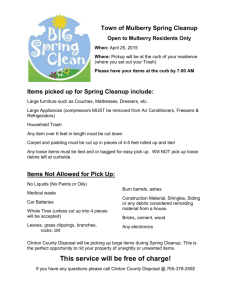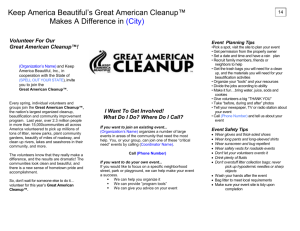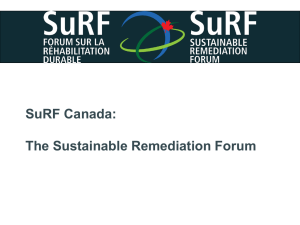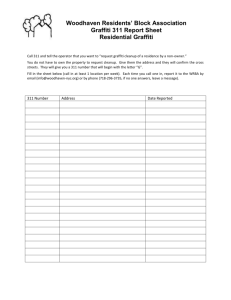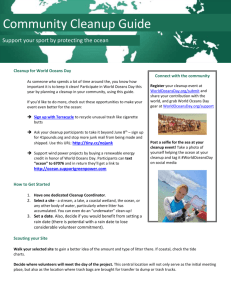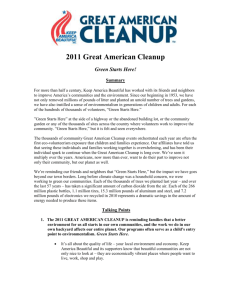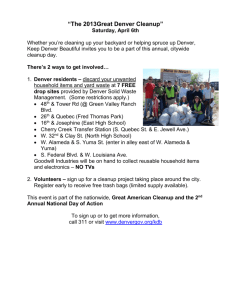Messaging about the International Coastal Cleanup on Social Media
advertisement
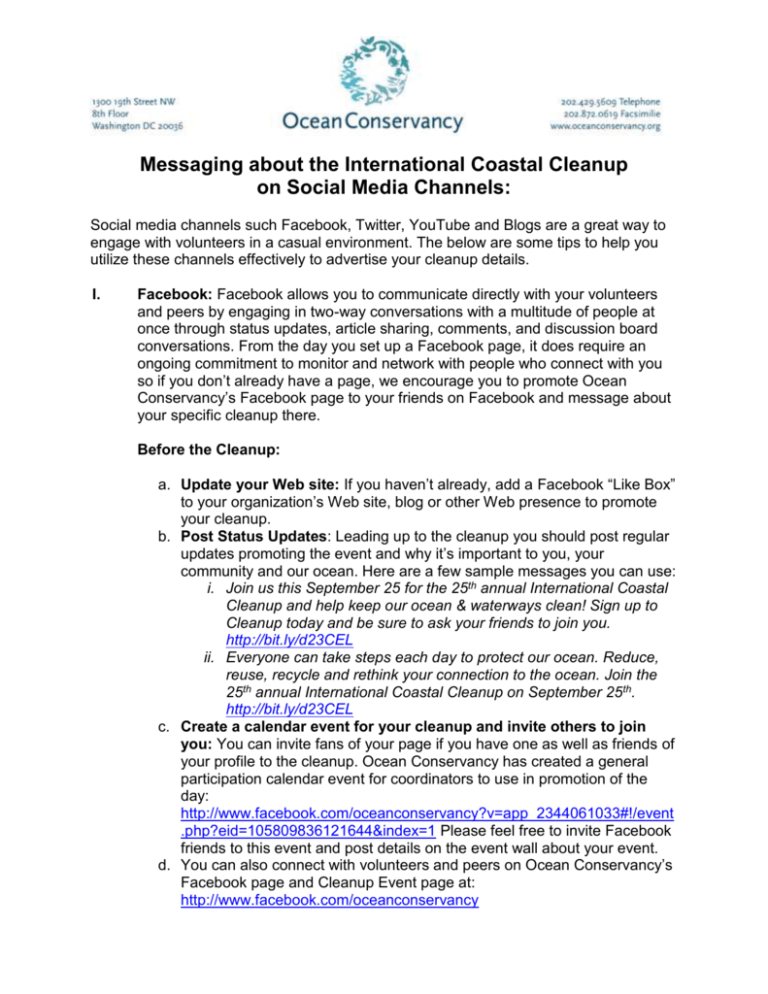
Messaging about the International Coastal Cleanup on Social Media Channels: Social media channels such Facebook, Twitter, YouTube and Blogs are a great way to engage with volunteers in a casual environment. The below are some tips to help you utilize these channels effectively to advertise your cleanup details. I. Facebook: Facebook allows you to communicate directly with your volunteers and peers by engaging in two-way conversations with a multitude of people at once through status updates, article sharing, comments, and discussion board conversations. From the day you set up a Facebook page, it does require an ongoing commitment to monitor and network with people who connect with you so if you don’t already have a page, we encourage you to promote Ocean Conservancy’s Facebook page to your friends on Facebook and message about your specific cleanup there. Before the Cleanup: a. Update your Web site: If you haven’t already, add a Facebook “Like Box” to your organization’s Web site, blog or other Web presence to promote your cleanup. b. Post Status Updates: Leading up to the cleanup you should post regular updates promoting the event and why it’s important to you, your community and our ocean. Here are a few sample messages you can use: i. Join us this September 25 for the 25th annual International Coastal Cleanup and help keep our ocean & waterways clean! Sign up to Cleanup today and be sure to ask your friends to join you. http://bit.ly/d23CEL ii. Everyone can take steps each day to protect our ocean. Reduce, reuse, recycle and rethink your connection to the ocean. Join the 25th annual International Coastal Cleanup on September 25 th. http://bit.ly/d23CEL c. Create a calendar event for your cleanup and invite others to join you: You can invite fans of your page if you have one as well as friends of your profile to the cleanup. Ocean Conservancy has created a general participation calendar event for coordinators to use in promotion of the day: http://www.facebook.com/oceanconservancy?v=app_2344061033#!/event .php?eid=105809836121644&index=1 Please feel free to invite Facebook friends to this event and post details on the event wall about your event. d. You can also connect with volunteers and peers on Ocean Conservancy’s Facebook page and Cleanup Event page at: http://www.facebook.com/oceanconservancy During in the Cleanup: Just because your event has started doesn’t mean the marketing has ended! At your sign-in desk for the cleanup promote the use of Facebook as a way for people to share their photos and experiences right from the cleanup. Many people will have smart phones (such as an iPhone or Droid) and will be able to upload information directly to Facebook from the cleanup. Be sure to include either your own Facebook page information on your materials or Ocean Conservancy’s: http://www.facebook.com/oceanconservancy and ask everyone to tag yourself and Ocean Conservancy in all photos so that we can share with everyone. After the Cleanup: After the event write a status update that thanks everyone for participating and includes your thoughts on how the cleanup went, what you learned, what you saw, and how it all made you feel. Be sure to encourage fans and friends to leave comments there as well. In addition to thanking everyone, be sure to upload your photos to Facebook and tag everyone you know in them and then ask them to “fill in the blanks” by tagging anyone else. Be sure to also tag Ocean Conservancy so we can share the photos with our fans as well! II. Twitter: Twitter is a free social messaging tool that lets people stay connected with others through brief 140 character message updates. Updates are posted on users’ Twitter profile page through SMS text messaging, the Twitter Web site, instant messaging, RSS, e-mail, or through other social applications and sites, such as Facebook. You can use Twitter to find out about Marine Debris news and engage with businesses, organizations, and people who are interested in your event. Before the Cleanup: a. Use the hashtag: The hashtag for the ICC is: #2010cleanup. Hashtags are used to search for a particular event or topic on Twitter. We encourage you to tweet out this hashtag and use it on all tweets relating to the cleanup to help spread the word. We chose #2010cleanup because it can easily be incorporated into the Tweet and does not need to necessarily just be added to the end of the line. We also chose it because it includes inland and beach cleanups as well as domestic and international. b. Status Updates: Leading up to the cleanup post regular updates about the cleanup with links for your followers to signup for the event and/or learn more. Be sure to vary your messages so they are all not just asking people to attend the cleanup. Here are a few samples to get your started: i. Join us this Sept 25 for the #2010cleanup. Sign up to cleanup! @ourocean http://bit.ly/d23CEL Spread the word & please RT! ii. No matter where we live, the ocean is our life support system. Lets keep it clean! #2010cleanup @ourocean http://bit.ly/d23CEL c. Follow Ocean Conservancy & we’ll help promote your event on Twitter: www.twitter.com/OurOcean We will retweet your tweets promoting your area’s cleanup whenever possible. Just include @ourocean in the Tweet so we get notified about the update. During in the Cleanup: Ask people to tweet out memorable items found as they pick them up or their favorite reason for helping to cleanup. Make sure everyone knows the Twitter hashtag: #2010cleanup by putting it in your materials, on name tags, and ask your speakers if you have them announce it during their speech. After the Cleanup: Thank everyone for participating in the 2010 International Coastal Cleanup and continue the conversation by offering preliminary information about the results for your cleanup if you have them. Sample Messages: 1. Thx to all who helped w/ the #2010cleanup! It was a BIG success! Updates on items found coming soon. 2. Thx to the 100+ volunteers who picked up trash at the #2010cleanup our ocean is one step closer to being free of trash. III. YouTube: YouTube is a video sharing community on which users can upload and share videos both via channels within the YouTube Web site and also by embedding the videos on external Web sites. Ocean Conservancy has a set of ICC-related videos you can use to help promote the cleanup on your own Web site or channels. a. Videos available for embedding/sharing: i. PSA calling for people to signup to cleanup by Philippe Cousteau: http://www.youtube.com/watch?v=SKJQhslI2yw ii. Short video discussing the marine debris problem and the importance of the International Cleanup calling for people to join us for the 25th Anniversary Cleanup this Fall: http://www.youtube.com/watch?v=Ysaa64XBbcQ iii. General International Coastal Cleanup Video: http://www.youtube.com/watch?v=TX5WAEeqwYU&feature=chann el IV. Blogs: Blogs are a great way to casually speak to an open audience about your cleanup and the marine debris issue. Whether through an existing blog or a blog created specifically for your cleanup, be sure to create posts announcing the event, calls for volunteers or site captions if relevant, and sponsorship opportunities. Follow up with guest posts from local leaders who should welcome the opportunity to reach their audience. During the event, you can ask a volunteer or staff member to post a live blog post with a photo from the event. After the event create a blog post of your reflections on how the cleanup went, what you learned, what you saw, and how it all made you feel. Be sure to ask for feedback from people who attended so we can learn how to make the cleanups even better in the future. Ocean Conservancy does not actively maintain an organizational blog but we would be happy to contribute to yours as a guest blogger for a day or by submitting comments. Please contact Sara Thomas: sthomas@oceanconservancy.org if you would like for us to contribute in either way.
